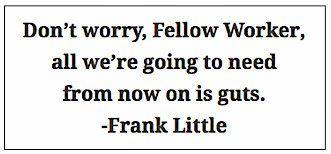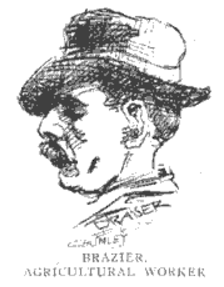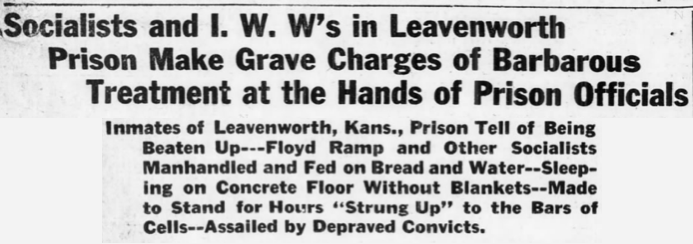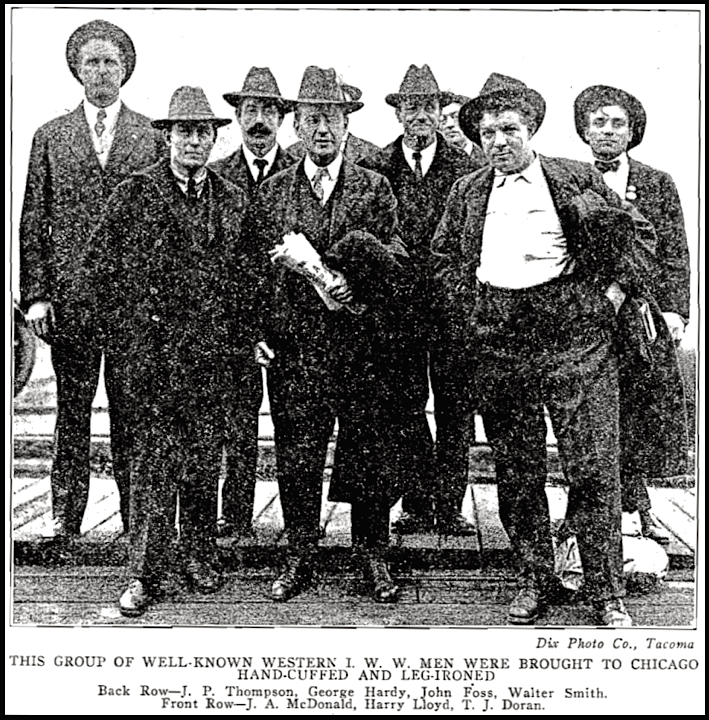
Hellraisers Journal – Thursday January 16, 1919
Leavenworth Penitentiary – Report on Brutal Treatment of Prisoners, Part II
From The New Appeal of January 11, 1919:
[Part 2 of 2.]
Summing up the results of his inquiry, Mr. Moore [Attorney for the Industrial Workers of the World] says:
Extremely fragmentary as is the above, I believe that the following points may be considered as fully established:
1. That negro convicts armed with clubs were used under the direction of Mr. Fletcher [Deputy Warden] to beat up white men. That among those so beaten up were Stratton, Murphy and Floyd Ramp.
2. That many prisoners, whose physical condition was extremely bad, were placed on bread and water diet and deprived of their blankets and compelled to sleep on the cement floor at a time when this would seriously endanger their health.
3. That many prisoners were chained by their wrists to the sides of their cells and so compelled to stand for a period in excess of twenty-four hours.
Visits Husband in Cell.
In an affidavit, of which The New Appeal has been furnished a copy, Mrs. Floyd Ramp, wife of one of the solitary prisoners, states that she was allowed a brief visit with her husband on December 15, having come to Leavenworth in response to a report from friends that her husband had been seriously injured. Mrs. Ramp states that she was not permitted to question her husband regarding his injuries, but that his right eye was badly discolored and he was in an emaciated condition. Owing to the presence of the guard she could elicit no information of what had occurred beyond the most vague and unsatisfactory references. Ramp did say that Stratton was “pretty badly hurt.” Mrs. Ramp states “that Jack Phelan, who was released from the Leavenworth prison on December 18 because declared by the Appellate Court to have been illegally incarcerated on a charge of violating the Espionage Act, told her he had seen Floyd Ramp’s body and that it was a mass of bruises which led him to believe that he had been beaten, kicked and trampled upon.”
Released Prisoner Talks.
In a letter of some length accompanying the copy of her affidavit, Mrs. Ramp gives corroborative statements made to her by the released prisoner, Jack Phelan. Mr. Phelan’s knowledge of what occurred is necessarily incomplete as it was gained through the “underground” channels by which such news travels within prison walls.
Mrs. Ramp says Phelan told her that, as far as he could learn, six men were shut up in a single cell, the light in the cell turned off, and that they were then set upon by negroes armed with clubs; that twenty-two men were “strung up”-tied to the bars of their cells by the wrists and forced to stand for hours in this painful position; that one prisoner told Phelan of having, a month or so previously, been attacked by men armed with baseball bats sawed off so that they could be swung easily in the small space of the cell and who were protected by masks over the face and pads on arms and body; that Elmer Glitsch, a lad of twenty or twenty-one years of age, appealed to prison officials for protection against the vicious assaults of a depraved convict with whom he was penned up, but that no attention was paid to his plea; that the stringing up of prisoners is a regular practice, while beating up is a less frequent occurrence.
Leavenworth an Old Offender.
Brief though the evidence we have related is, as a result of the truth-suppressing devices of prison censorship, it is sufficient to excite the alarm and indignation of the humane reader. These reports are indubitably of a nature and gravity to demand thorough investigation. This is not the first time The New Appeal has been instrumental in placing before the public damning revelations of what transpires within the black solitude of penitentiary cells. Our readers will recall that once before this same Leavenworth institution felt the force of this paper’s publicity and as a result of exposures of brutality and depravity conducted as a systematic feature of the prison regime, Warden McCloughery was removed from office. Now we are furnished with new and revolting details of what is practiced in this place today.
The fact that these victims of official brutality are serving sentences for anti-war activity cannot excuse in the slightest the “cruel and unusual punishment” disclosed in the reports that we have given. To treat men, guilty of whatever crime, in this medieval manner can serve no purpose other than to indulge the lust for viciousness that insanely characterizes the human fiend. And we feel that attention should be called to the fact that the men thus abused are not of the ordinary convict type, but in the main men highly developed intellectually and emotionally, men of deep social convictions, men who were imprisoned for their active beliefs, a circumstance worthy of a certain undoubted respect. We should mention that the prisoners during their trial and following their conviction persisted in denying that they had ever intentionally sought to obstruct the nation’s war machinery.
A Relic of the Past.
But even common criminals should be humanely dealt with. Punishment that extends to persecution is, so far as enlightened social sanction goes, a black relic of the past. Indeed the modern, humanitarian idea is that criminals should be segregated solely with the object of protecting society from injury at their hands-not that deliberate injury should be wantonly imposed upon criminals by society. Such scenes as those reported having taken place at Leavenworth are condemned unreservedly by sentiments of humanity, considerations of public policy and the principles of modern criminology.
There is no possible doubt that the primitive policy evidently being followed at Leavenworth is without the consent or cognizance of the Washington authorities. The fact that even worse conditions prevailed at Camp Funston with regard to the treatment of conscientious objectors, until the war department learned the ugly truth and immediately called a halt, reinforces our conviction that the persecutions at Leavenworth are the unauthorized perpetrations of petty vindictive prison officials.
Authorities Must Know the Truth.
The New Appeal feels certain that when the higher authorities are made aware of the full truth, and we shall see that they are made fully aware of the truth, they will not hesitate to rid the prison of its present [?] warden-a recent incumbent, Aleton [Felix Alston], of Wyoming [Warden of state penitentiary at Rawlins], said to have a past record of prison terrorism-and his conniving deputy, Fletcher, ex-captain of Georgia National Guards, and to institute a decent regime. We do not believe these men have sufficient political pull to save them if government investigation shows them to have been guilty of the practices charged. We here and now demand that the government proceed without delay to allow a little wholesome daylight to penetrate and permeate the dark corners of Leavenworth prison. Let Mr. Aleton and Mr. Fletcher be brought to bar and forced to give an account of their actions.
———-
[Emphasis added.]
~~~~~~~~~~~~~~~~~~~~~~
SOURCES & IMAGES
Quote from Frank Little, Chicago, July 1917
Wobbly: The Rough-and-tumble Story of an American Radical
-by Ralph Chaplin
University of Chicago Press, Jan 1, 1948
Chapter 18-War, pages 208-9
https://books.google.com/books?id=n-ygPQAACAAJ
The New Appeal
(Girard, Kansas)
-Jan 11, 1919
https://www.newspapers.com/image/67587211/
Notes for PARTS I & II:
See also re Part I:
Hellraisers Journal – Wednesday January 15, 1919
Leavenworth Penitentiary, Kansas – Brutal Treatment of Prisoners Reported
American Political Prisoners:
Prosecutions Under the Espionage and Sedition Acts
-by Stephen Martin Kohn
Greenwood Publishing Group, 1994
(search separately: Brazier – Foss – Hamilton – Ramp)
Note: Stratton, no entry.
Note re Murphy: All searches for this Murphy were unsuccessful. This is not the John L. Murphy from Kohn’s study as that Murphy was one of the Sacramento IWWs who arrived after January 16, 1919.
https://books.google.com/books?id=-_xHbn9dtaAC
IWW Prisoners in Leavenworth Prison as of April 1 1922
-scroll down to lists.
re Ed Hamilton: he was released in Dec 1921 and is, therefore, not on list with Chicago group, scroll down to “Attitude of the Administration,” for more on his release.
http://debs.indstate.edu/a505t7_1922.pdf
For more on Richard Brazier
Big Red Songbook: 250+ IWW Songs!
-ed by Archie Green, David Roediger,
–Franklin Rosemont, Salvatore Salerno
PM Press, Feb 19, 2016
(search: “Richard Brazier”)
Note: Songs are numbered by first appearance in Little Red Songbook.
This search brings up a racist title which is not the title of Brazier’s song, but, instead, the title for tune used by Brazier for:
Song #2 (2nd song of first edition) “If You Workers Would Only Unite.”
https://books.google.com/books?id=QaXECwAAQBAJ
If you workers would only unite, unite In one union grand,
Against your masters you could win your fight, fight, fight,
Throughout the land.
No need to be always on the hog [broke]
Or pay a shark two dollars for a job,
If you workers would only unite, unite.

Richard Brazier lived until 1974. Ever loyal to the IWW, he remained active in labor cause to the end. Like others of his youth, he had accepted racial stereotypes without much thought. Happily, he and fellow workers welcomed humane views of race as times changed. In my only visit with Brazier (1960), he exhibited a keenness of spirit characteristic of “old Wobblies I had encountered. He accepted the fact that most of his compositions were dated; he believed that workers could aid their movement with song.
[Photograph added.]
Note: Sadly, I could not determine which of the editors is the “I” above.
Photo: IWWC 1916, Delg Brazier, ISR 1917
https://books.google.com/books/reader?id=SVRIAAAAYAAJ&printsec=frontcover&output=reader&source=gbs_atb&pg=GBS.PA406
For more on John M. Foss
Tag: John M. Foss
https://weneverforget.org/tag/john-m-foss/
Photo: Western IWW Men Brought to Chicago for Trial, ISR Jan 1918
https://archive.org/stream/ISR-volume18#page/n171/mode/1upWIR, IWW Thompson, Hardy,
re Abuse of Stratton and Floyd Ramp:
Congressional Record Vol. LVII
Proceedings and Debates of the 3rd Session
-of the 65th Congress of USA
U.S. Government Printing Office, 1919
https://books.google.com/books?id=54KdyJnMTDgC
Page 2779-Feb 5, 1919
re so-called “mutiny” at Leavenworth-
https://play.google.com/books/reader?id=54KdyJnMTDgC&hl=en&pg=GBS.PA2779
To Congressman DENT,
Chairman House Committee on Military Affairs, Washington.HONORABLE SIR: At your request I beg to submit a résumé of inhuman treatment of military and political prisoners, which I respectfully recommend for your kind and immediate consideration and action, as some are already dead, others dying by inches, while all are more or less in constant jeopardy of life or health:
[…..]
21. The so-called “mutiny” at Fort Leavenworth: The “crusher gang,” composed of physically unfit, were ordered to do twice as much work as formerly. Refusing, the “punishment gang” was sent over; but, seeing how matters stood, they also refused. All were ordered into solitary, and Acting Warden Fletcher started after, them with a bat. A prisoner, Stratton, shouted, “Don’t do that,” for which he was beaten into unconsciousness lasting 50 hours. When Stratton spoke, the warden drew a pistol, tried to fire at him, but cartridge failed to explode. Stratton raised a stool to protect himself, and, in fear of his life, threw it at the warden.
Floyd Ramp received a double compound fracture of the skull.
After being locked in solitary, two big brutes—Wingfield and “Mack,” the former with a bat and the latter with a piece of pipe—were set to task of beating them. Ray [Rey] and Axuara [Azuara] were beaten unmercifully, and two besides Stratton were unconscious for a long time. Many were handcuffed to doors, feet barely touching the floor. Hodges, Baskett, and Plahn were sick, and prison doctor ordered mattresses, which warden later removed. On the third day they were taken down so the prison inspector should not see them.
[…..]
THEO. H. LUNDE,
President American Industrial Co.,
811 Rees Street, Chicago.WASHINGTON, D. C., January 13, 1919.
[Emphasis added.]
———-
See also re Part II:
re Warden Felix Alston of Wyoming
http://wyomuseum.state.wy.us/pdf/felixalston.pdf
Note: The warden of Leavenworth was Thomas W. Morgan until about December 8, 1918, when it was reported by the Leavenworth Post that he had resigned. Deputy Warden L. J. Fletcher, “a stern disciplinarian,” then became acting warden. The appointment of August V. Anderson as the new warden was reported by the Post on April 10, 1919.
Leavenworth Post
(Leavenworth, Kansas)
-Dec 8, 1918
https://www.newspapers.com/image/109861404/
-April 10, 1919
https://www.newspapers.com/image/109782400/
~~~~~~~~~~~~~~~~~~~~~~~~~~~~~~~~~~~~~~~~~~~~~
The Workers of the World are Now Awaking – Willard Losinger
Lyrics by Richard Brazier


